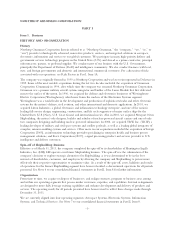Northrop Grumman 2011 Annual Report Download - page 20
Download and view the complete annual report
Please find page 20 of the 2011 Northrop Grumman annual report below. You can navigate through the pages in the report by either clicking on the pages listed below, or by using the keyword search tool below to find specific information within the annual report.NORTHROP GRUMMAN CORPORATION
In August 2011, Congress enacted the Budget Control Act which, while raising the existing statutory limit on
the amount of permissible federal debt, also committed the U.S. Government to significantly reducing the
federal deficit over ten years. The Budget Control Act established caps on discretionary spending through
2021, reducing federal spending by approximately $940 billion relative to the fiscal year 2012 Presidential
Budget submission. It also established a Joint Committee of Congress (the Joint Committee) that was
responsible for identifying an additional $1.2 to $1.5 trillion in deficit reductions by November 23, 2011. The
Joint Committee was unable to identify the additional deficit reductions by this deadline thereby triggering a
second provision of the Budget Control Act called “sequestration,” which calls for very substantial automatic
spending cuts split between defense and non-defense programs scheduled to start in 2013 and continue over a
nine-year period. While we believe efforts may be underway to prevent the automatic spending cuts scheduled
to begin in 2013, the outcome of these efforts is uncertain, and we are unable to predict the impact that either
identified or automatic cuts would have on funding for our individual programs. Long-term funding for
certain programs in which we participate is likely to be reduced, delayed or cancelled. In addition, these cuts
could adversely affect the viability of the suppliers and subcontractors under our programs. While we believe
that our business is well-positioned in areas that the DoD has indicated are areas of focus for future defense
spending, the impact of the Budget Control Act remains uncertain and our business and industry could be
materially adversely affected. In January 2012, the Secretary of Defense announced a number of program
changes and cancellations that are scheduled to take place over the next several years, in part to comply with
certain provisions of the Budget Control Act. Certain of these program changes and cancellations are expected
to have an impact on programs in which we participate.
䡲As a U.S. Government contractor, we are subject to various procurement regulations and could be adversely
affected by changes in regulations or any negative findings from a U.S. Government audit or investigation.
U.S. Government contractors must comply with many significant procurement regulations and other
requirements. These regulations and requirements, although customary in government contracts, increase our
performance and compliance costs. New regulations or procurement requirements (including, for example,
regarding counterfeit parts) or changes to current ones, could increase our costs and risks of compliance and
reduce our margins.
We operate in a highly regulated environment and are routinely audited and reviewed by the
U.S. Government and its agencies, such as the Defense Contract Audit Agency (DCAA) and Defense Contract
Management Agency (DCMA). These agencies review performance under our contracts, our cost structure
and our compliance with applicable laws, regulations and standards, as well as the adequacy of, and our
compliance with, our internal control systems and policies. Systems that are subject to review include, but are
not limited to, our accounting systems, purchasing systems, billing systems, property management and control
systems, cost estimating systems, compensation systems and management information systems. Any costs
ultimately found to be unallowable or improperly allocated to a specific contract will not be reimbursed or
must be refunded if already reimbursed. If an audit uncovers improper or illegal activities, we may be subject
to civil and criminal penalties, sanctions or suspension or debarment from doing business with the
U.S. Government. Whether or not illegal activities are alleged, the U.S. Government also has the ability to
decrease or withhold certain payments when it deems systems subject to its review to be inadequate. In
addition, we could suffer serious reputational harm if allegations of impropriety were made against us. If such
actions were to result in suspension or debarment, this could have a material adverse effect on our business.
The U.S. Government, from time to time, recommends to its contractors that certain contract prices be
reduced, or that costs allocated to certain contracts be disallowed. These recommendations can involve
substantial amounts. In the past, as a result of such audits and other investigations and inquiries, we have on
occasion reduced our contract prices and the costs allocated to our government contracts.
We are also, from time to time, subject to U.S. Government investigations relating to our operations, and we
are subject to or expected to perform in compliance with a vast array of federal laws, including but not limited
to the Truth in Negotiations Act, the False Claims Act, the Procurement Integrity Act, Cost Accounting
-10-
























